May 26, 2017
Edited by David Sanders
Specimen Days
709—Aldhelm, Abbot of Malmesbury, Bishop of Sherborne. English poet and scholar (b. cica 639), dies.
1595— Valens Acidalius, German critic and poet (b. 1567), dies.
1681—Pedro Calderón de la Barca, Spanish dramatist, poet and writer of the Spanish Golden Age, dies at 81.
1830—Jules de Geyter, Belgian poet (International), is born.
1846— Naim Frashëri, Albanian poet and writer(d. 1900), is born.
1899— Kazi Nazrul Islam, Bengali poet, musician, revolutionary and philosopher (d. 1976), is born.
1900 —Alain Grandbois, French Canadian poet (d. 1975), is born.
1908 —Theodore Roethke, US, poet (Words for the Wind), is born.
1938 —Raymond Carver, poet/short story writer (Furious Season), is born.
1985 —Robert Nathan, US writer/poet (Portrait of Jennie), dies at 91.
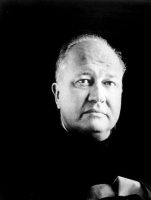
In the long journey out of the self,
There are many detours, washed-out interrupted raw places
Where the shale slides dangerously
And the back wheels hang almost over the edge
At the sudden veering, the moment of turning.
Better to hug close, wary of rubble and falling stones.
The arroyo cracking the road, the wind-bitten buttes, the canyons,
Creeks swollen in midsummer from the flash-flood roaring into the narrow valley.
— from “Journey Into The Interior” by Theodore Roethke
“In the long journey out of the self, / There are many detours” – Theodore Roethke
World Poetry
Lorna Goodison is Jamaica's First Female Poet Laureate
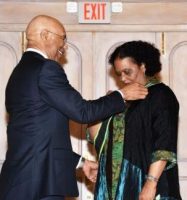
Accomplished author, Lorna Goodison, has been selected to be Jamaica's first female Poet Laureate. She is the second nationally appointed Poet Laureate, following Professor Emeritus, Mervyn Morris, of the University of the West Indies (UWI), who held the position from 2014 to 2016. The Poet Laureate is a national honour that recognises a distinguished Jamaican poet for his or her significant contribution to the nation's literary community.
$50,000 from Auction of Anne Frank Poem to Finance Holocaust Memorial

A friend of Anne Frank who recently sold a poem handwritten by the teenage diarist for $155,000 has donated a third of the money to the building of a Holocaust memorial for Dutch Jews. Jacqueline van Maarsen, who was a childhood friend of Anne Frank, received the poem in the 1970s from her sister, Christiane, who gave her the poem because Jacqueline was closer to Anne, the NOS public broadcaster reported Thursday. The sisters are not Jewish.
Accomplished author, Lorna Goodison, has been selected to be Jamaica’s first female Poet Laureate.
Recent Reviews
Silage by Bethany W. Pope Review – Poetry as Salvation
This harrowing collection drawn from a youth spent in an orphanage delights in language as a place of private escape
by Nicholas Lezard
In modern poetry, let’s face it, not a lot happens, unless you are writing a novel in verse or updating The Iliad. Musing tends to be the order of the day. This collection is different. It begins with the narrator – very obviously the poet herself – seeing “a white / thread running across [her] MRI”: this is “the shape of the worst years of my life / thrown up on a screen in a doctor’s office; / I’d gone in to see if anything could / be done about my terrible snoring.” The rest of the poem (“Neurons”) continues with references to an old social worker, lost records, the remembered smell of wild onion blossoms, the memory of being locked in a cabinet under the stairs. What is going on here? The remaining 34 poems explain, as she dredges up a sequence of memories, what it was like to live in a state-run South Carolina orphanage between the ages of 12 and 15 in (I suspect, from internal evidence) the early to mid-1990s.
British Museum by Daljit Nagra Review – A Questing, Questioning Third Volume
The poet breaks new, more political ground in a significant departure of style
by Ben Wilkinson
When Daljit Nagra’s mischievous and distinctive first book of poems won the Forward debut prize 10 years ago, it prompted a frenzy of interview requests and newspaper features. “Immigrant’s Son Wins Forward” hollered one tabloid, while broadsheets wondered at the animated new writer publishing his debut with the esteemed Faber and Faber. At best, this was indicative of a mainstream British culture eager to package the writer as multicultural or postcolonial; at worst, it was an example of the social divisions and cultural unease that still plague our political climate with increasingly disturbing ramifications.
For the Poet Bao Phi, a Violent Past Is Never Far Away
by Marianne Combs

Bao Phi was just three months old when his family fled the war in Vietnam in the mid-‘70s. "Violence has been a part of my life since forever," he said. His family settled in the Phillips neighborhood of Minneapolis, where neighbors associated them with a failed war — and the enemy. "People would routinely say things like 'go back to where you come from,'" he said. "People thought we were stealing their pets and eating them.”
Bao Phi was just three months old when his family fled the war in Vietnam in the mid-‘70s.
Broadsides
Lunching with Ginsberg
by August Kleinzahler
It would have been February 5, William Burroughs's birthday. Ginsberg was in a panic about having forgotten it (Burroughs's seventy-fifth)—only one among his several panics that gray, frigid Sunday afternoon on East 12th Street. Ginsberg's anxiety resembled that of a favored child loath to disappoint a loving parent. No, that wouldn't be quite it: Burroughs as a loving parent, no. Perhaps it was more Auntie Allen not wanting to let down his weird elderly nephew. There was a fair bit of the doting auntie in Allen Ginsberg.
The Canonization of Dylan Thomas
by Bernard Schwartz
I delight in a palpable imaginable visitable past—in the nearer distances and the clearer mysteries, the marks and signs of a world we may reach over to as by making a long arm we grasp an object at the other end of our own table. The table is the one, the common expanse, and where we lean, so stretching, we find it firm and continuous. That, to my imagination, is the past fragrant of all, or of almost all, the poetry of the thing outlived and lost and gone, and yet in which the precious element of closeness, telling so of connections but tasting so of differences, remains appreciable.
We are divided, of course, between liking to feel the past strange and liking to feel it familiar; the difficulty is, for intensity, to catch it at the moment when the scales of the balance hang with the right evenness.
That’s Henry James in the preface to The Aspern Papers, a story about a literary critic’s Venetian quest to acquire a dead poet’s papers. This story doesn’t have a lot in common with James’s, but they are both ghost stories, with ghosts who don’t so much haunt the proceedings as hover just out of reach. As with James’s poet, Jeffrey Aspern, you will not meet Dylan Thomas in this story, nor hear his poems. As with James’s poet, Dylan is dead right from the start. But his afterlife does not exist without the poetry.
Sorting Seamus Heaney's Study: I Could Hear Archivists Groan as We Threw Things Away
Rand Brandes recalls his year with the poet indexing decades of manuscripts and correspondence, the groundwork for his archives
by Rand Brandes

As Seamus Heaney headed out the door of our home in Hickory, North Carolina, I handed him a rain stick that I pulled from my collection of world percussive instruments. The rain stick was a token of appreciation for the time he spent with us at Lenoir-Rhyne College in March 1992 (and in lieu of a real honorarium). A year later, to my surprise Heaney’s poem The Rain Stick appeared in the New Republic and it was dedicated to my wife Beth and me. The Rain Stick was later collected in Heaney’s first post-Nobel volume, The Spirit Level, where the poem assumes the place of honour by opening the work.
A friend of Seamus Heaney has written about his year with the poet indexing decades of manuscripts and correspondence.
Drafts & Fragments
Los Angeles Poet Will Celebrate His Birthday as Mall of America’s Writer-in-Residence
by Richard Horgan
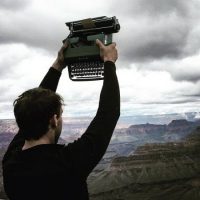
The Mall of America didn’t realize this at first when they considered Brian Sonia-Wallace for the sprawling complex’s 25th anniversary writer-in-residence contest. But the Los Angeles-based poet is most uniquely qualified for this sort of work. Sonia-Wallace is a 2016-17 Amtrak writer-in-residence and has also done residencies with the City of Los Angeles, the U.S. National Parks system, Dollar Shave Club and L.A.’s ArtsWork Theater. Refrains, trains and automobiles, if you will.
Whitman Poem Transformed into a Map of Brooklyn
by Frank Jacobs
“Flood-tide below me! I watch you face to face; Clouds of the west! Sun here half an hour high! I see you also face to face” So begins Crossing Brooklyn Ferry, a stirring, enumerative ramble of a poem by Walt Whitman, first published in 1856 under the title Sun Down Poem and later included in Leaves of Grass, his constantly-expanding magnum opus. And so begins this map of Brooklyn, filled out from top to bottom and left to right with the almost 2,000 words that Whitman used to transform a mundane ferry ride from Manhattan to Brooklyn into a paean for New York, a metaphor for a journey of the soul, and a contemplation of his connection to all humanity, present and future.
Brian Sonia-Wallace is the winner of the Mall of America’s writer-in-residence contest.
Poetry In the News
Poet Wins $65K Sophie Kerr Literary Prize

The editor of the school newspaper at a Maryland college has been named the winner of the nation's largest literary prize for undergraduates. Catalina Righter of Manchester, Maryland, was the winner of this year's Sophie Kerr Prize at Washington College. Righter was chosen from five finalists to be awarded the more than $65,000 prize at a ceremony Friday, which marks the 50th anniversary of the prize.
Sinn Fein Tried to Block Charles and Camilla Trip to Heaney HomePlace

Sinn Fein councillors have been accused of undermining Prince Charles' recent trip to Northern Ireland after they attempted to block his visit to a centre dedicated to Seamus Heaney. It is understood the party's representatives tried to thwart a Mid Ulster Council proposal to host a reception for Prince Charles and the Duchess of Cornwall while they were on a two-day trip to Northern Ireland.
Trees Planted by Robert Frost Felled by Wind
Fans familiar with the work of Robert Frost understand the edifying role that nature, and trees in particular, played in the poets work. Tragically, two trees tended by Frost himself were toppled in Shaftsbury this weekend in the midst of persistent high winds. The trees, a grey birch and a snow apple tree, were planted by Frost when he resided in what is now the Robert Frost Stone House Museum, bought by the author in 1920.
New Books
Second Nature by Patricia Carlin
[Paperback] Marsh Hawk Press, 80 pp., $15.00
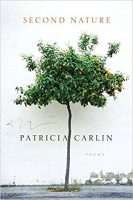
"'Windows slam shut, like widows, or stones'—these poems carry a braid of unspoken stories. Visionary, honed, distilled, charged with the immediacy of a dream before you coax it into a story and the challenges of our baffling history, Patricia Carlin's poems remind me—entirely on their own terms—of the intimate 'you must change your life' urgency of the Duino Elegies. Carlin's lines ride on the breath, vulnerable to their own insight—'before this life we were together / and never now again'—and her eloquence has an edge of silence. Second Nature is stunning work."—D. Nurkse
Human Achievements by Lauren Hunter
[Paperback] Birds, LLC, 96 pp., $16.00
"Human Achievements is full of friends, aching, bleeding, feeling fine, the city, and listening. You know the right song can change everything, and can be a conduit for energy or rage? 'I look the day right in the eye and tell it to go fuck itself.' The right song can also turn you into a ghost." — Amy Lawless
Gates & Fields by Jennifer Firestone
[Paperback] Belladonna, 120 pp., $15.00
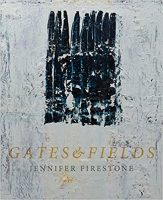
In dialogue with Emily Dickinson and other voices from the past, Gates & Fields maps a poetics of meditation and disjuncture, where loss is inconceivable and language, faith, and the rituals of grief fall short. Gates & Fields demands an attention to the dead, the dying, and those left behind.
Sweet Velocity by Rachel Moritz
[Paperback] Lost Roads Press, 76 pp., $15.00
Rachel Moritz's powerfully sweet Sweet Velocity delivers a lived-in world—material, object- oriented and also lyrically distinctive. The song here treats a serene, sometimes bemused, engagement with life passages—the essentials of coming into and going out of the world, of bringing about and of letting go. But Moritz's song, like the Dickinsonian one, also abrades the conventions it observes. Poetry is the result. An eccentric system. "[S]tops of flow before the animal."
Holy Ghost by David Brazil
[Paperback] City Lights Publishers, 118 pp., $15.95

The third full-length collection from poet-scholar-activist David Brazil records his struggle to forge a relationship between two distinct vocations—street activist in Occupy Oakland and its aftermath, and unorthodox pastor exploring the path of radical Christian discipleship. Holy Ghost pulls toward the place where class struggle meets the will of God.
In “Holy Ghost” David Brazil records his struggle to forge a relationship between two distinct vocations—street activist and pastor.
Correspondences
Not Silent
Timothy Yu finds poetry for this political moment
by Linda Falkenstein

One of this young century’s great literary feuds began on April 18, 2011, right here in Madison, at Union South. It was part of the celebration surrounding the opening of the lavishly revamped building, Union South 2.0, and the former poet laureate of the United States, Billy Collins, was the headline literary event. Timothy Yu, a poet and associate professor of English and Asian American Studies, was impressed with the turnout in Varsity Hall: “There were 1,200 people there,” says Yu. “I thought, wow, what kind of poet can bring out 1,200 people?”
The House of Song: An Interview with Michael Robbins
By Daniel Johnson
After his first two collections, Alien vs. Predator and The Second Sex, Michael Robbins drew comparisons to poets like Frederick Seidel and Paul Muldoon. In those poems—with titles like “My New Asshole” and “Pissing in One Hand”—Robbins is concerned for the fate of the whales, and he’s unafraid to spit vitriol about banks, oil pipelines, Xbox, Jesus, Jay Z. He writes about the modern world with such referential range, and such sharpness, that you can almost miss his superhuman command of verse and rhyme, which Dwight Garner has called “dizzying.” Those poems are anchored by constant allusions and tributes to the music Robbins loves. Most memorably, in Alien vs. Predator’s “I Did This to My Vocabulary,” he exclaims the names of heavy-metal bands as Santa Claus roll calls his reindeer in “The Night Before Christmas”: “On Sabbath, on Slayer, on Maiden and Venom! / On Motorhead, and Leppard, and Zeppelin, and Mayhem!”
Ocean Vuong on Being Generous in Your Work
by Amy Rose Spiegel
Ocean Vuong is an American poet and essayist based in New York City. Even though his most recent book, 2016’s Night Sky with Exit Wounds, was a collection of poems, Vuong is now engaged in the task of writing what he calls “the ghost of a novel.” His work is predicated on the notion that both reading and writing are acts that require generosity and a willingness to explore.
Envoi: Editor’s Notes
Lessons from the Past: Theodore Roethke
I first came upon the work of Theodore Roethke, including the poem excerpted above, through a textbook I was assigned in college, Naked Poetry edited by Stephen Berg and Robert Mezey. Devoted to American poetry in "open" forms, the book was an anthology of poets who embodied the free-verse movement of the sixties: Creeley, Stafford, Levertov, Bly, Rexroth, etc. Although many had a passing impact on me, Roethke's work affected me in an almost spiritual way, particularly the poem quoted in part here. And as most of the names have been shelved in the strata of the intervening years, I have been aware of the recession of Roethke's name as well. Last week I found a copy of that textbook in a book sale, where I forked over the thirty cents to take it home.
Here is Roethke's thought on the poetic process; one that feels all too true to me:
"The poem, even a short time after being written, seems no miracle; unwritten, it seems something beyond the capacity of the gods."